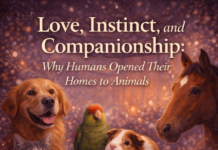In the midst of rapid technological advancements and urbanization, there is an emerging condition that may have significant implications for humanity’s mental and physical health: Nature-Deficit Disorder. While not officially recognized as a medical diagnosis, this term, popularized by journalist Richard Louv in his book Last Child in the Woods, highlights the negative consequences of a life spent increasingly indoors and disconnected from the natural world.
What is Nature-Deficit Disorder?
Nature-Deficit Disorder refers to the idea that the lack of exposure to nature—especially for children and young adults—can contribute to a wide range of health and behavioral problems. With the rise of digital entertainment, urban living, and sedentary lifestyles, people are spending less time outdoors. According to the Environmental Protection Agency (EPA), Americans spend approximately 90% of their time indoors. This growing trend is leading to a variety of physical and mental health issues, which are now being linked to the absence of regular contact with the natural environment.
The Consequences of Disconnecting from Nature
- Mental Health Issues: Research shows that spending time in nature can reduce stress, anxiety, and depression. The absence of natural stimuli like sunlight, greenery, and fresh air can exacerbate feelings of isolation and unhappiness. This is particularly concerning given the rise in anxiety and depression among young people.
- Cognitive and Behavioral Problems: Studies suggest that children who spend more time in green spaces show better concentration, problem-solving skills, and emotional regulation. In contrast, those deprived of outdoor play may struggle with attention disorders like ADHD, have shorter attention spans, and experience more difficulties in social interactions.
- Physical Health Decline: The lack of outdoor activity has been linked to increased obesity rates, weakened immune systems, and poor cardiovascular health. Spending time in nature encourages physical exercise, which is essential for maintaining a healthy lifestyle. Natural light exposure also regulates our circadian rhythms, helping with better sleep patterns.
- Loss of Empathy for the Environment: A growing disconnect from nature can lead to a diminished sense of responsibility towards the environment. Without a personal connection to natural spaces, younger generations may be less motivated to engage in sustainability and conservation efforts. This can have long-term consequences for the planet as we face challenges like climate change, deforestation, and biodiversity loss.
Why is This Happening?
There are several factors contributing to the rise of Nature-Deficit Disorder:
- Digital Technology: The allure of smartphones, gaming, and social media keeps people indoors for longer periods, making the natural world seem less appealing.
- Urbanization: With more people living in densely populated cities, access to green spaces is becoming limited. Urban areas often prioritize infrastructure and development over parks and natural reserves.
- Parental Concerns: Modern parenting often focuses on safety, leading to more indoor activities rather than letting children roam freely outdoors. This “nature phobia” is exacerbated by fears of traffic, stranger danger, and environmental hazards.
How Communities Are Addressing Nature-Deficit Disorder
Recognizing the negative impact of nature deprivation, communities around the world are taking steps to reconnect people with the natural environment:
- Urban Green Spaces: Cities are investing in parks, rooftop gardens, and green corridors to make nature more accessible to urban residents. These green spaces not only promote physical health but also provide social gathering spots that enhance community well-being.
- Forest Schools and Outdoor Education: Schools and childcare centers are adopting outdoor classrooms and forest school programs that encourage children to learn through nature-based play. This hands-on approach fosters curiosity, creativity, and a love for the environment.
- Nature Prescriptions: Some healthcare providers are now prescribing time in nature as a treatment for anxiety, depression, and chronic stress. These “green prescriptions” encourage patients to spend time in parks, gardens, or nearby forests as part of their recovery process.
- Community Gardens and Nature Trails: Communities are establishing local gardens, nature trails, and wildlife sanctuaries to encourage people of all ages to spend more time outdoors. These initiatives help reconnect people to nature while also supporting local biodiversity.
What Can Individuals Do?
While communities and governments play a critical role, individuals can also take steps to mitigate the effects of Nature-Deficit Disorder:
- Daily Walks in Green Spaces: Even a 30-minute walk in a local park can have significant benefits for mental health.
- Limit Screen Time: Reducing digital distractions allows for more time to explore the outdoors and engage in physical activities.
- Outdoor Hobbies: Activities like gardening, birdwatching, hiking, or simply spending time at the beach can foster a deeper connection with the environment.
- Nature-Based Mindfulness: Practicing mindfulness exercises in natural settings can amplify the calming effects of both meditation and nature.
Looking Ahead: The Future of Our Connection with Nature
As technology continues to evolve, the gap between humans and nature is likely to widen if proactive steps are not taken. To combat Nature-Deficit Disorder, there needs to be a collective effort from individuals, communities, and policymakers to prioritize green spaces and nature-based activities. This shift can help build a healthier, more resilient society that values the natural world and the well-being it fosters.
While it is easy to become absorbed in the fast-paced digital world, the benefits of stepping outside and reconnecting with nature are profound. As the evidence shows, being in touch with nature is not just a luxury—it’s a necessity for our physical, emotional, and psychological well-being.
By fostering a culture that values and respects nature, we can ensure that future generations grow up with a strong sense of stewardship towards the planet and a deep appreciation for its beauty and healing power.

Photo by Ben White on Unsplash
Views: 5






